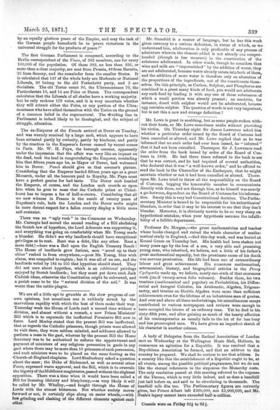Mr. Lowe is great in snubbing, but as some people
reckon with- out their hosts, so Mr. Lowe sometimes snubs without providing his victim. On Thursday night Sir James Lawrence asked him whether a particular order issued by the Board of Customs had been cancelled or altered, and Mr. Lowe replied that as he was informed that no such order had ever been issued, he " inferred" that it had not been cancelled. Thereupon Sir J. Lawrence read the order from the book issued by order of the Board of Cus- toms in 1868. He had three times referred to the book to see that he was correct, and he had inquired of several authorities, who declared that it was " a well-known order," and he offered to send the book to the Chancellor of the Exchequer, that he might ascertain whether or not it had been cancelled or altered. There- upon Mr. Lowe tried to throw all the responsibility on the Board of Customs, begging the honourable member to communicate directly with them, and not through him, as he himself was merely a go-between, dependent on the Board of Customs for his informa- tion. Surely this is very bad Constitutional doctrine. The Parlia- mentary Minister is bound to be responsible for his subordinates' blunders, in order that it may be his interest to see that they don't blunder. Moreover, it is obviously unwise to be so very sharp on hypothetical mistakes, when your hypothesis assumes the infalli- bility of a fallible department.


































 Previous page
Previous page